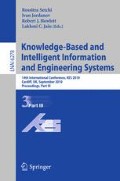Abstract
The present paper will aim at bringing into light a particular issue related to those situations in which a chance is faked. That is, when an agent acts as if a chance were present in his cognitive niche, when it is not. In illustrating the idea of chance-faking, we will take advantage of the notion of bullshit introduced by Frankfurt. The notion of bullshit has quite recently acquired a theoretical and philosophical dignity. Described as the careless attitude that an agent has towards the truth-value of what he believes in, the notion of bullshit will be taken as a case in point for shedding light on the phenomenon of chance-faking. In the last part of the paper, we will investigate the confabulating dimension of chance-faking introducing the idea of chance-confabulator.
Access this chapter
Tax calculation will be finalised at checkout
Purchases are for personal use only
Preview
Unable to display preview. Download preview PDF.
References
Oshawa, Y., McBurney, P. (eds.): Chance Discovery. Springer, Berlin (2003)
Magnani, L.: Chance discovery and the disembodiment of mind. In: Oehlmann, R., Abe, A., Ohsawa, Y. (eds.) Proceedings of the Workshop on Chance Discovery: from Data Interaction to Scenario Creation, International Conference on Machine Learning (ICML 2005), pp. 53–59 (2005)
Magnani, L., Bardone, E.: Sharing representations and creating chances through cognitive niche construction. The role of affordances and abduction. In: Iwata, S., Oshawa, Y., Tsumoto, S., Zhong, N., Shi, Y., Magnani, L. (eds.) Communications and Discoveries from Multidisciplinary Data, pp. 3–40. Springer, Berlin (2008)
Magnani, L.: Abductive Cognition. The Eco-Cognitive Dimension of Hypothetical Reasoning. Springer, Heidelberg (2009)
Abe, A.: Cognitive chance discovery. In: Stephanidis, C. (ed.) UAHCI 2009, Part I. LNCS, vol. 5614, pp. 315–323. Springer, Heidelberg (2009)
Peirce, C.S.: Collected Papers of Charles Sanders Peirce. Harvard University Press, Cambridge (1931-1958); Hartshorne, C., Weiss, P. (eds.), vols. 1-6, Burks, A. W. (ed.), vols. 7-8
Thomas, H.J.: Are theories of imagery theories of imagination? An active perception approach to conscious mental content. Cognitive Science 23(2), 207–245 (1999)
Odling-Smee, F.J., Laland, K.N., Feldman, M.W.: Niche Construction. The Neglected Process in Evolution. Princeton University Press, Princeton (2003)
Bardone, E.: Seeking Chances. From Biased Rationality to Distributed Cognition (2010) (forthcoming)
Frankfurt, H.: On Bullshit. Princeton University Press, Princeton (2005)
Misak, C.: Pragmatism and solidarity, bullshit, and other deformities of truth. Midwest Studies in Philosophy 32, 111–121 (2008)
Vrij, A.: Detecting Lies and Deceit Pitfalls and Opportunities. Wiley, New York (2008)
Simon, H.A.: Altruism and economics. American Economic Review 83(2), 157–161 (1993)
Jackson, S.: Black box arguments. Argumentation 22, 437–446 (2008)
Thompson, P.: Deception as a semantic attack. In: Kott, A., McEneaney, W. (eds.) Adversarial Reasoning: Computational Approaches to Reading the Opponent’s Mind, pp. 125–144. Chapman & Hall/CRC, Boca Raton (2007)
Hirstein, W.: Introduction. what is confabulation? In: Hirstein, W. (ed.) Confabulation: Views from Neuroscience, Psychiatry, Psychology and Philosophy, pp. 1–12. Oxford University Press, Oxford (2009)
Schnider, A.: Spontaneous confabulation, reality monitoring, and the limbic system: A review. Brain Research Reviews 36, 150–160 (2001)
Fotopoulou, A., Conway, M., Solms, M.: Confabulation: Motivated reality monitoring. Neuropsychologia 45, 2180–2190 (2007)
Szatkowska, I., Szymajska, O., Bojarski, P., Grabowska, A.: Cognitive inhibition in patients with medial orbitofrontal damage. Experimental Brain Research 181(1), 109–115 (2007)
Hirstein, W.: Brain Fiction. Self-Deception and the Riddle of Confabulation. The MIT Press, Cambridge (2005)
Author information
Authors and Affiliations
Editor information
Editors and Affiliations
Rights and permissions
Copyright information
© 2010 Springer-Verlag Berlin Heidelberg
About this paper
Cite this paper
Magnani, L., Bardone, E. (2010). Faking Chance. In: Setchi, R., Jordanov, I., Howlett, R.J., Jain, L.C. (eds) Knowledge-Based and Intelligent Information and Engineering Systems. KES 2010. Lecture Notes in Computer Science(), vol 6278. Springer, Berlin, Heidelberg. https://doi.org/10.1007/978-3-642-15393-8_38
Download citation
DOI: https://doi.org/10.1007/978-3-642-15393-8_38
Publisher Name: Springer, Berlin, Heidelberg
Print ISBN: 978-3-642-15392-1
Online ISBN: 978-3-642-15393-8
eBook Packages: Computer ScienceComputer Science (R0)

